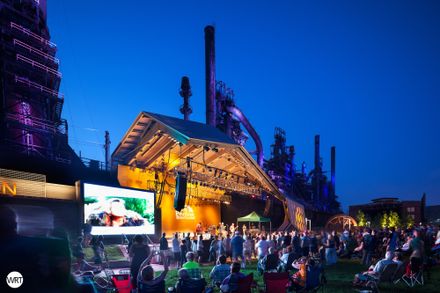The Levitt Pavilion
PHOTOGRAPHS
Paul Warchol, Jeffrey Totaro
STRUCTURAL ENGINEER
Simpson Gumpertz and Heger
SERVICE BUILDING
Klein And Hoffman
MEP ENGINEER
Lehigh Valley Engineering
GENERAL CONTRACTOR
Boyle Construction
ACOUSTICS
Metropolitan Acoustics LLC
LIGHTING
Environmental Acoustics
CLIENT
Redevelopment Authority of the City of Bethlehem
YEAR
2011
The Levitt Pavilion is the focal point of the 9.5-acre SteelStacks Arts and Cultural Campus, part of the larger re-development of the former Bethlehem Steel mill, source of steel for many iconic structures like the Golden Gate Bridge and Chrysler building.
By design, the mill’s five 20-story blast furnaces, iconic in their own right, form a dramatic backdrop the newly created 21st Century Town Square project. Knitted together in its repurposed industrial landscape are four new plazas, a playground, a picnic area, and at the heart of it stands the Levitt Pavilion.
The Pavilion neither blends with the rusted stacks nor visually competes with them. Clad in perforated, stainless-steel panels, the shell is an asymmetrical segmented arch that touches the ground on one side and cantilevers over the stage.
It was conceived as a large-scale origami-like folded plate sculpture - one that poignantly suggests yet-to-be completed work. The design is resolutely forward-looking, yet intent on establishing a discourse between new and old.
As one moves around the shell its form and character transform, at times appearing solid and monolithic, at times trellis-like and transparent.
The amphitheater bowl’s chevron shaped COR-TEN steel and precast concrete retaining walls echo the folded plates of the pavilion’s shell, establishing a dialogue that binds the overall site together.
The open space and design elements of the new landscape became a foreground to the powerful scale and physicality of the five gigantic blast furnaces.
As a significant design catalyst, the critical planning intervention removed a segment of East First Street where it intersects Founder’s Way and replaced it with a wide curve to enable the insertion of an ideally shaped amphitheater strategically positioned to become the heart of the campus.














